
All icons by permission of Saint Isaac’s Skete at Skete.com
In our super-busy world, even good Christian people seem to think that being active all the time – go, go, go – is the best way to make the world a better place. Well, sometimes it is. Sometimes maybe. And sometimes…
Saint Antony spent over half of his eighty five adult years alone seeking God and holiness, and thereby he became one of the most influential saints of ancient times.
In this case Saint Athanasios, Patriarch of Alexandria, took refuge with the desert monks during his several exiles, and there he came to know Antony. He wrote 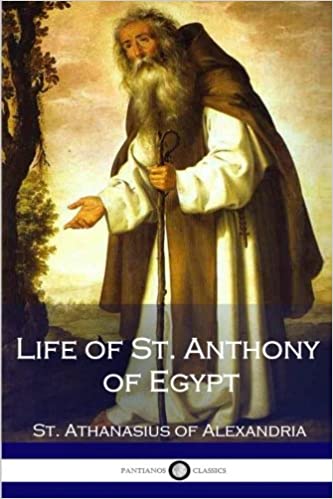 The Life of Saint Antony which became the ancient equivalent of a best seller, read from one end of the Empire to the other. And I’d guess that neither of them suspected that sixteen centuries later that book would be available from Amazon and many other places on Kindle, Audio-books and in traditional book form.
The Life of Saint Antony which became the ancient equivalent of a best seller, read from one end of the Empire to the other. And I’d guess that neither of them suspected that sixteen centuries later that book would be available from Amazon and many other places on Kindle, Audio-books and in traditional book form.
When people become truly holy, no matter how much they wish to be alone, God often sends people to them – and then for centuries thereafter! – and enormous good comes of it.
Saint Antony’s Life
Antony was from a village near the Thebaid desert in Upper Egypt, born in the year 251 to Coptic Orthodox parents. *
- Copts are the original Egyptians. Note the names “Egypt” and Copt. For several centuries Egypt was a Christian country. Today, despite all, Egypt still is about 10% Christian, over six million Orthodox – more than in the United States.
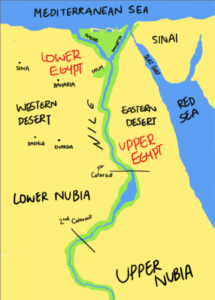
(For you who are interested in geography, Upper Egypt is to the south – upstream the Nile towards its source. Lower Egypt is to the north – down the Nile towards the Mediterranean. Got that?)
from Resources for History Teachers
Antony was a serious boy, didn’t do well in school, but he loved to attend church and memorized long passages of Scripture. When he was twenty his parents died, leaving Antony well off and responsible for his younger sister. He was restless, not knowing what to do with his life.
Then one Sunday at Liturgy he heard the story we hear each year about the rich young man whom Jesus called to give away all he had and “come, follow me”. It went straight into Antony’s heart. Antony knew he was the rich young man. Jesus was speaking to him. He sold his property, left money to care for his sister, gave the rest away and went to live in poverty with an ascetic in a nearby village.
A brief interlude about Ascetics
These, I think you know, are people who seek God and purity and holiness and, in order to avoid distractions, live a very simple disciplined life with much prayer and fasting. In early times, before there were formally organized monasteries, there were individual ascetics, and also little groups of them who stayed near each other for support and encouragement. Some stayed in town or nearby countryside; others went off into the wilderness..
Why would people want to be so “counter-cultural”? Some like Antony felt God calling, almost compelling them to go “outside the camp”. Some were escaping temptations. Some wanted to escape the absurdities of society. Why, in our crazy modern world, are there not throngs of people leaving for the desert?.
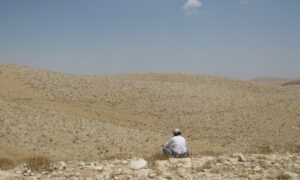
Judaean Desert: Deror Avi
Back to Saint Antony
Antony supported himself working with his hands, and was guided by his spiritual father whose name we don’t know. He slept on the bare ground, ate only bread and a little salt, drank only water. The devil plagued him. Whether he suffered from dreams or visions or apparitions we don’t know, but they were real enough to him. He was tempted at night, whisperings about the things he had given up. He fled into tombs outside the village, where things were not better but worse. An immense man terrified him; a monk appeared with fancy food. He was physically assaulted. Friends would find him in the morning lying bruised, seemingly half dead. They must have thought he had lost his mind. (Are you wondering the same?)
The message for us is: Do not any of you think that withdrawing from the world, from people, will solve your problems. It will not. For our problems are chiefly within us, and if we go off by ourselves, we will have to face them directly. Most people who do this don’t become holy; they go mad. Saint Antony was a rare exception to the rule.
When Antony was 35, he decided to get it over with. He left the village and the tombs and went out into the desert by himself. Athanasios wrote: “he found upon the far side of the river a deserted fort… blocked up the entrance and laid in a six months supply of bread”. * There was water in the fort.
- Paximadia, which lasts nearly forever. Today it is served for Greek funeral meals, for obvious symbolic reasons.

from Greek Boston
“Antony went there as if to a shrine”, Athanasios wrote, and lived there alone, “never going out nor ever seeing those who came to him.” At first he thought he had escaped the demons, but then they let loose again: a mass of spectral lions, bears, leopards, bulls, serpents scorpions, wolves threatening to attack him. Then he learned that if he made the sign of the  Cross and called on Christ, they went away but left him lying exhausted.
Cross and called on Christ, they went away but left him lying exhausted.
Then one night Antony saw Christ. Antony said to Him: “All these years I’ve struggled alone. Where were you?” Jesus said to him: “I was here, Antony, but I wanted to see you fight.”
Finally years later, as Antony was sitting one day weaving baskets, an immense monster both man and beast appeared. Antony looked up and said: “I am the servant of Christ. If you want to attack me, here I am.” Antony was still living in the material desert, but he had passed through his interior desert and was safe now on the other side. And the beast fell down dead.
Another Interlude: The Desert
From the time of the Exodus the desert has been the symbol of escape from slavery, of passing through difficulties so we can emerge on the other side. The Hebrews passed through the desert for forty years before they arrived in the Promised Land. Christ was forty days in the desert being tempted by Satan, and then emerged ready for His ministry.
So with us. Here is a pattern of what can happen to each of us when we confront our “demons”. Because we all have them, we all have to struggle against something, sometimes many things within us: greed, lust, anger, violence, envy, laziness, drink, drugs and more. You know your demons, I know mine. The struggle can sometimes be fierce. We may fear that they’re going to destroy us. But if we are faithful, make the sign of the cross, call on the Lord and hang in there (and are humble enough to get professional help, if we need it) – finally we will come to the point where if they come at us again, we can just look up and, with Antony, say: Do what you want. I belong to Christ. I am safe with Christ.
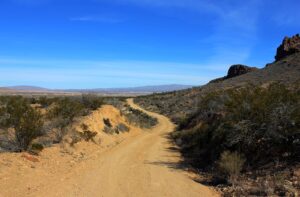
by Yinan Chen
You and I are not there yet. We’re still going through the desert. Where is Christ in the midst of our struggles? He is here – but He wants to see us fight. However even He can’t save us if we don’t want to be saved. We need to fight.
Antony told Athanasios, “When you have put fear away, then there comes the most perfect joy and contentment and courage and recovery of strength and calmness of thought and stoutheartedness too and love of God. Therefore be of good cheer and pray for your joy, and the peace of your soul will speak of the holiness of Him who is present. So Abraham seeing the Lord rejoiced and John hearing the voice of Mary the Mother of God leaped for joy.”
Anthony was speaking of what he had learned for himself. No doubt that was how Saint Athanasios learned his own calm and peace of mind through the dreadful struggles that were thrown against him. (See: “Father Bill’s Orthodox Blog Post 16. Outside the Camp: What we can learn from Saint Athanasius the Great”. Sorry, all the images are gone.)
Back again to the Story
Antony was twenty years alone in his fort. A friend brought bread twice a year. People would knock at the gates, but he would not let them in. Finally they broke down the door. Antony was 55 years old now. They didn’t know what to expect: an emaciated old holy man? a madman?
Athanasios wrote “Antony came forth as out of a shrine as one initiated into the mysteries and filled with the spirit of God… they marveled to see how his body remained unchanged since they had last seen him, neither grown fat through lack of exercise nor gaunt from fasting and wrestling with devils. He looked indeed exactly as he was before he went into his solitary confinement. His clarity of soul shone through. Grief had not harrowed him, nor had pleasure touched him, he showed no dejection of mind, no extremes of joy. He was not excited by the presence of the crowd, nor was he elated to see so many acclaiming him. Utterly tranquil, he seemed a man ruled by reason and shaped as nature had designed him.”
Saint Antony was now entirely “put together”, as we would say. He had attained holiness in this life which left him in great shape, not only spiritually but also physically.

Now began a new period of Antony’s life, fifty years in which he welcomed visitors and shared what he had learned. Soon below his cave were several monasteries, one of which remains to this day.
Twice he traveled down to Alexandria, once in 311 to aid Christians who were being persecuted, and again twenty years later to support Saint Athanasios in his struggle against the Arians. Scholars came to visit him and were amazed that a man with so little formal learning could know so much. Remember how he disliked school, never took vows, was never ordained. Antony said to them: 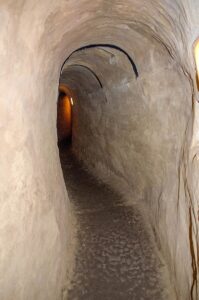 “Where do you suppose the books came from? From people who had already discovered the truth for themselves.” Finally the crowds got to be too much, and Antony had to get away again. He went further into the desert and settled high in cave on a mountain. But he would come down now and again to visit his monasteries.
“Where do you suppose the books came from? From people who had already discovered the truth for themselves.” Finally the crowds got to be too much, and Antony had to get away again. He went further into the desert and settled high in cave on a mountain. But he would come down now and again to visit his monasteries.
Saint Athanasios wrote “From his youth till his old age, he kept his zeal for asceticism, he did not give in to the desire for costly foods because of his age, nor did he alter his clothing because of the infirmity of his body… He remained very healthy and he could see well because his eyes were sound and undimmed. Not one of his teeth fell out, though they wore down near to the gums due to his advanced age. He remained strong in his hands and feet… He was spoken of everywhere, and was admired by everyone, and was sought even by those who had not seen him, which is evidence of his virtue and of a soul dear to God.”
Just before his death Antony gathered a few disciples and said “Bury my body in the earth and let no one else know the place. At the Resurrection of the Dead I shall receive it back incorruptible from the Savior. Give away my garments. Give Athanasios my sheepskin cloak which he gave me, which I have worn out with wearing; to Bishop Serapion my other sheepskin and keep the hairshirt for yourselves. And now, my children, God bless you. Antony is going and is with you no more.” Saint Antony the Great died January 10, 356, age 105. He had spent 85 years in the desert.
Most sources say the monks ignored his instructions and kept his relics which were taken to Alexandria, then to Constantinople, then were stolen by Crusaders and are now in Arles, France. However, the monks at Saint Antony’s Monastery say Not so. He’s still buried here somewhere, but we don’t know where.
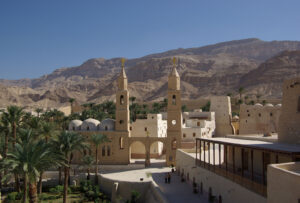
Saint Antony’s Monastery by Berthold Werner, from Free Software Foundation
Saint Antony today
 In his book From the Holy Mountain William Dalrymple told how, about twenty five years ago, he traveled what remained of the Christian Middle East. He visited Saint Antony’s Monastery, where the monks told him that their fathers appeared regularly to them. It’s worth reading the entire passage:
In his book From the Holy Mountain William Dalrymple told how, about twenty five years ago, he traveled what remained of the Christian Middle East. He visited Saint Antony’s Monastery, where the monks told him that their fathers appeared regularly to them. It’s worth reading the entire passage:
Father Dioscorus told Dalrymple that some Protestants had just visited and were perplexed by this. Father Dioscorus said: “I had to take the Protestants aside and explain that we believe Saint Antony and all the fathers have not really died, that they live with us, continually protecting us and looking after us. When they are needed, when we go to their graves and pray to their relics, they appear and sort out our problems.” “I’m not joking” said Father Dioscorus. Dalrymple asked “Can the monks see them?“ “Who? the Protestants?” “No, the deceased fathers.” “Abuna Yustus is always appearing” said Father Dioscuros matter of factly. “One of the fathers had a half hour conversation with him day before yesterday. And of course Saint Antony makes fairly regular appearances, although he is very busy these days answering prayers all over the world.” He concluded, “Even when we cannot see the departed fathers we can always feel them. Just because the saints have died that doesn’t mean they’re gone.”
Next Week: The Prayers nobody pays attention to
Week after Next: The Three Hierarchs: the Feast of Learning – the importance of knowledge, facts, truth, reason